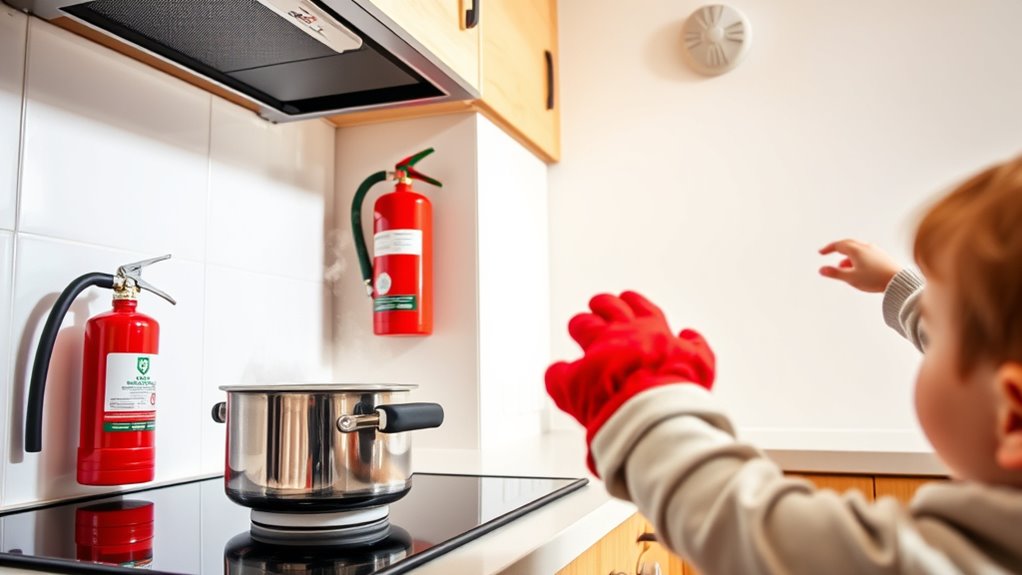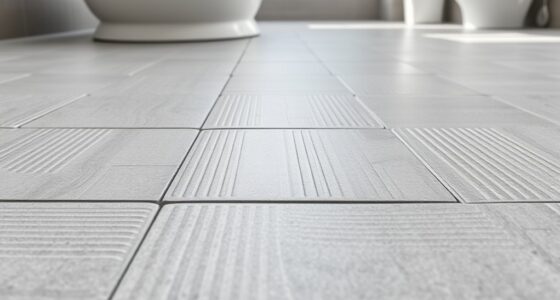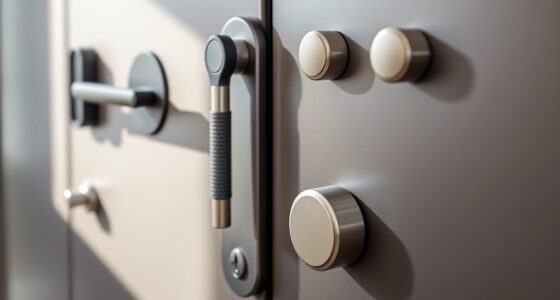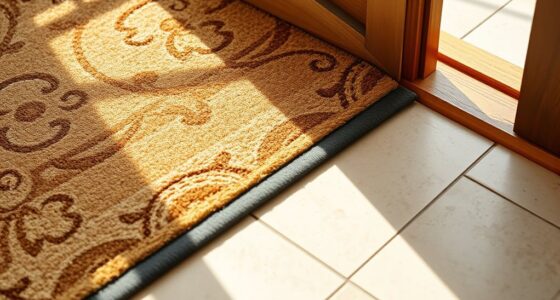To prevent fires, scalds, and accidents in your kitchen, stay attentive and follow essential safety steps. Keep knives sharp, use stable cookware, and turn pot handles inward. Regularly clean your stove to avoid grease buildup, and never leave cooking unattended. Keep flammable items away from heat sources and use oven mitts for hot items. Maintaining a clutter-free workspace and staying vigilant helps prevent mishaps, and if you continue, you’ll learn more effective safety tips.
Key Takeaways
- Keep the kitchen clean and free of clutter, especially flammable items near the stove.
- Regularly maintain and clean appliances to prevent grease buildup and malfunctions.
- Use oven mitts and proper tools when handling hot items to avoid burns and scalds.
- Store knives securely and handle them carefully to prevent cuts and injuries.
- Never leave cooking unattended and turn off burners immediately after use to reduce fire risk.

The kitchen is a busy space where accidents can happen in an instant, but many of these mishaps are preventable. Staying safe begins with paying attention to knife safety and stove maintenance. When handling knives, always keep your blades sharp. Dull knives require more force, increasing the risk of slips that can cut your fingers. Use a stable cutting board and keep your fingers tucked under your hand, guiding the knife with your knuckles rather than the tips. Never try to catch a falling knife; instead, step back and let it fall. Store knives properly in a knife block or on a magnetic strip, keeping blades out of reach of children and preventing accidental cuts.
Stove maintenance plays a vital role in preventing fires and burns. Regularly clean your stovetop to remove grease and food buildup, which can ignite unexpectedly. Always check that burners are turned off after cooking and ensure the knobs are in the off position before leaving the kitchen. When using the stove, avoid leaving pots and pans unattended; a small distraction can lead to boiling over or fires. Use appropriate cookware that fits the burner size to prevent tipping. Check gas lines or electric connections periodically for leaks or damage. If you smell gas, turn off the stove immediately, open windows, and contact a professional to inspect the appliances. Proper stove maintenance not only reduces fire risk but also guarantees your appliances work efficiently.
In addition to knife safety and stove upkeep, keep your workspace clear of clutter. Clear away old towels, paper, or plastic items that could catch fire easily. Always use oven mitts when handling hot pots or pans, and keep flammable items away from the stovetop. Be cautious with loose clothing that might catch fire or get caught on hot surfaces. When frying or boiling, stay nearby, and never fill pots to the brim—boiling liquids can spill over and cause burns or fires. Always turn pot handles inward to avoid knocking them over accidentally. Remember, safety is a continuous process, and staying vigilant helps prevent many common kitchen accidents.
Frequently Asked Questions
How Can I Childproof My Kitchen Effectively?
You can childproof your kitchen effectively by installing childproof cabinet locks to prevent access to dangerous items and using stove knob covers to avoid accidental burns or activation. Keep sharp utensils and cleaning supplies out of reach, and always supervise your children. Securing trash cans and securing appliances also helps. Making these simple changes creates a safer environment and minimizes risks for your little one.
What Are the Best Fire Extinguishers for Kitchen Use?
Your kitchen deserves the best fire extinguisher to handle any blaze! Go for a multi-purpose extinguisher with an ABC rating—these are unbeatable for kitchen fire safety, tackling everything from grease fires to electrical mishaps. Look for a compact, easy-to-use model with a high fire extinguisher rating. Keep it accessible and ready; it’s your first line of defense when fire strikes!
How Often Should I Check Smoke Detectors?
You should check your smoke detector monthly to guarantee it’s working properly. Regular smoke detector maintenance involves testing the alarm at least once a month, using the test button. Additionally, replace the batteries at least once a year, or sooner if the alarm chirps. Remember, maintaining your smoke detector’s functionality is essential for safety. Following the recommended alarm testing frequency keeps you protected and alerts you promptly in case of fire.
Are There Safe Alternatives to Traditional Stovetop Cooking?
Yes, there are safe alternatives to traditional stovetop cooking, like electric alternatives and microwave cooking. You can use electric skillets, hot plates, or induction cookers for safer, controlled heating. Microwave cooking offers quick, efficient meal prep without open flames or hot surfaces. Just make certain you follow safety guidelines, use microwave-safe containers, and avoid overheating to prevent accidents and ensure your kitchen remains safe.
How Do I Safely Dispose of Hot Oil and Grease?
Like Da Vinci’s ingenuity, you should reuse your hot oil wisely. Let it cool completely before handling, then pour it into a container for oil recycling or grease disposal, never down the drain. Use a funnel to avoid spills, and seal the container tightly. Check local regulations for proper disposal methods. This keeps your kitchen safe and the environment protected, just as art preserves beauty.
Conclusion
By staying alert and following simple safety tips, you can prevent fires, scalds, and accidents in your kitchen. Sometimes, a small change—like keeping a fire extinguisher nearby or turning pot handles inward—can make all the difference. It’s no coincidence that mindful habits lead to safer cooking experiences. When you pay attention and prepare ahead, you create a kitchen where accidents are rarely a surprise. Safety becomes second nature, and you enjoy your time cooking even more.









